- Home
- Nancy Mitford
Nancy Mitford Page 2
Nancy Mitford Read online
Page 2
Her paternal grandfather Lord Redesdale was still alive, and she usually stayed under his roof in Kensington High Street while her sisters were born. Of the first Lord Redesdale, G.C.V.O., K.C.B., one derives a romantically gracious image, or series of images, from the two stout volumes of his Memories which had achieved a ninth edition in 1916, when Nancy was twelve years old. The photograph of the author reproduced as a frontispiece to the first volume portrays a dapper old Edwardian musketeer with a swirling white moustache. His gleaming top hat is tilted at a rakish angle; spectacles hang from a button of his double-breasted overcoat and gloves are tucked under his left-hand sleeve. He confronts the future with dignified equanimity. His past had been crammed with episodes of historical interest, all enjoyed with such gusto that one cannot agree with his granddaughter Jessica’s dismissal of his Memories as ‘monstrously boring’. Indeed many of his youthful experiences in the diplomatic service were thrilling if not unique.
As second secretary of the Embassy at St. Petersburg during the winter of 1863–64 he was able to see the Russia of Czar Alexander II under favourable auspices. Even then the Ambassador Lord Napier warned him to send all his letters in the Foreign Office bag—‘none by the Post Office, where all our letters are opened.’ ‘Surely,’ he replied, ‘they would not dream of opening the correspondence of so humble a person as myself.’ ‘Don’t be too sure of that,’ broke in Lady Napier. ‘The other day my children’s governess received two letters by the same post from different parts of England. Each contained a photo graph. The two letters came in one envelope, the two photo graphs in the other!’ His account of Court ceremonies and balls; of Prince Gortchakoff and Princess Kotchoubey’s political salon; are as vivid as that of the fanatical piety of the people and of their saturnalia during the week before Lent in Admiralty Place, perpetuated in music by Stravinsky’s Petroushka. His life in Peking during 1865-66 was described in greater detail in his delightful book The Attack at Peking. His next post in Japan was the most exhilarating. ‘Suddenly coming in full view of Mount Fuji, snow-capped, rearing its matchless cone heaven ward in one gracefully curving slope from the sea level,’ he was caught by the fever of intoxication which, as he wrote, ‘will continue to burn in my veins to the end of my life.’ Not only did he meet Prince Tokugawa Keiki, the last of the Shoguns, ‘a great noble if ever there was one. The pity of it was that he was an anachronism’—he and the dynamic British Minister Sir Harry Parkes were the first foreigners to be presented to the sacrosanct Mikado and I am tempted to quote his entire account of the episode but will restrain this to a single paragraph:
‘As we entered the room the Son of Heaven rose and acknowledged our bows. He was at that time a tall youth with a bright eye and clear complexion; his demeanour was very dignified, well becoming the heir of a dynasty many centuries older than any other sovereignty on the face of the globe. He was dressed in a white coat with long padded trousers of crimson silk trailing like a lady’s court-train. His head-dress was the same as that of his courtiers, though as a rule it was surmounted by a long, stiff, flat plume of black gauze. I call it a plume for want of a better word, but there was nothing feathery about it. His eyebrows were shaved off and painted in high up on the forehead; his cheeks were rouged and his lips painted with red and gold. His teeth were blackened. It was no small feat to look dignified under such a travesty of nature; but the sangre Azul would not be denied. It was not long, I may add, before the young sovereign cast adrift all these worn-out fashions and trammels of past ages, together with much else that was out of date.’
With Sir Harry Parkes he narrowly escaped murder by reactionary samurai for his support of the reformers. His early book Tales of Old Japan (1871) has deservedly become a classic, and as a child I longed for more stories of the same kind, where blood was mingled with haunting poetry.
After fourteen varied and adventurous years in the diplomatic service he resigned in 1873. Meetings with Sir Richard Burton and Abd el Kader in Damascus, with Garibaldi in self-imposed exile at Caprera, with Brigham Young in Salt Lake City—the rest of his autobiography is sprinkled with dramatic encounters and anecdotes of historical personages. Disraeli appointed him Secretary to the Board of Works in 1874—ten days after he had purchased a black opal which a friend had prophesied would bring him luck precisely within that period. At the end of the same year he married Lady Clementine Ogilvy, a daughter of the seventh Earl of Airlie, and there is reason to believe that it was a happy marriage though he maintained that ‘the veil of sanctity should mask the wedded life of even the humblest individual’.
During his twelve years with the Board of Works he was responsible for many improvements in Hyde Park, Hampton Court, Kew Gardens, and other neglected beauty spots. He then decided to turn country squire, which led to being ‘mixed up with the horse world,’ notably as judge and director of the International Horse Show at Olympia, and succumbed dutifully but reluctantly to membership of the House of Commons for three years. English to the core, he was yet a cosmopolitan polyglot in culture and his Memories reveal the multifaceted type of milordo inglese now almost obsolete. ‘Looking back,’ he asserted, ‘I claim the privilege of the sun-dial, and among the hours record only the serene.’
In 1906 he accompanied Prince Arthur of Connaught on a mission to invest the Mikado with the Order of the Garter in Japan—how transformed since his previous visit in 1868 when the juvenile Mikado, regarded as a demigod, ‘had descended from the clouds to take his place among the children of men, and not only that, but he had actually allowed his sacred face to be seen by, and had held communion with, “The Beasts from Without”.’ Since capturing Port Arthur and annihilating the Russian fleet in 1904 Japan had become one of the great powers and there was a general imitation of everything European—to the detriment of many an indigenous art and craft. In lieu of their former elegance crude European dress was prescribed for officials. The rapid metamorphosis was prodigious even then, and Lord Redesdale had been lucky to witness the feudal status quo. ‘Tell us how it was in the olden time,’ the courtiers begged him, curious to hear of their bygone ceremonial from this venerable foreigner.
The second volume of his Memories ends with a rhapsody on Wagner: ‘poetry and music are united in an indissoluble wedlock; the senses are enthralled, and the world bows before the great wizard.’
Lord Redesdale’s grandchildren inherited many of his gifts, and in perusing his suave autobiography one is often reminded of this inheritance. Nancy’s eyes resembled his, and a drawing of his profile at the age of twenty-eight by Samuel Lawrence resembled her brother Tom. In fact her generation appear to have had more in common with their grandfather than with their father and mother. One seems to hear Nancy’s voice in his lighter anecdotes. She has related that when her fourth sister was born, on 8th August, 1914, just when war had been declared, ‘she was christened Unity, after an actress my mother admired called Unity More (an early Peter Pan), and Valkyrie after the war maidens. Unity herself always spelt it Walkfire. This was Grandfather Redesdale’s idea; he said these maidens were not German but Scandinavian. He was a great friend of Siegfried Wagner’s and must have known.’ Eventually the actress and the war maiden were combined in Unity with tragic results.
Since the betrayal of Denmark in 1864, when the ‘scrap of paper signed by Prussia in 1852, assuring the inviolability of Denmark, was torn up’, Grandfather Redesdale had foreseen a calamitous general war, the outbreak of which was ‘by far the most vivid’ of Nancy’s fitful recollections. ‘When it appeared to be imminent,’ she wrote, Blor told me to pray for peace. But I thought, if we had war, England might be invaded; then, like Robin Hood, one would take to the greenwood tree and some how or another manage to kill a German. It was more than I could do to pray for peace. I prayed, as hard as I could, for war. I knew quite well how wicked this was: when my favourite uncle was killed I had terrible feelings of guilt.’ Thus the ten-year-old innocent shared the private sentiments of many a grizzled soldier and politician
.
Little Nancy’s prayers were answered but ‘the war turned out to be less exciting than I had hoped, though we did see the Zeppelin come down in flames at Potters Bar. I fell in love with Captain Platt in my father’s regiment, an important General of the next war, and crocheted endless pairs of khaki mittens for him—I am not sure that they were inflicted on him. In any case, all this crocheting was the nearest I ever got to killing an enemy, a fact which I am still regretting.’ She retained a lifelong interest in battles which I could not share, though I admired her per severance in trying to follow the campaigns of Frederick the Great when she was already an invalid.
Another memory which made an indelible impression on Nancy at the age of seven, was of Captain Scott’s tragic expedition to the South Pole. She devoured every book obtainable on the subject and would have won an examination on all its harrowing details summa cum laude. The hut under the active volcano of Mount Erebus where the Polar party were installed; Dr. Wilson’s appalling winter journey sixty miles along the coast to Cape Crozier in utter darkness and a freezing temperature to find the egg of an Emperor Penguin; the ascent of the dreaded Beardmore glacier towards the Pole; Seaman Evans’s death of frostbite and concussion; the suicide of Captain Oates who staggered into the blizzard with frostbitten feet ‘to try and save his comrades, beset by hardship’; and the final discovery of ‘Birdie’ Bowers, Dr. Wilson and Scott, all dead in their sleeping bags—every circumstance engraved itself on Nancy’s young imagination.
Captain Scott was to remain her hero of heroes, and the fact that he and his comrades ‘really wanted to prove to themselves how much they could endure’ haunted her till the end. The recollection of their sufferings often gave her courage to bear her own. Frequent references to Beardmore and Captain Oates cropped up in her letters, and she recounted their story in 1962, ‘fifty years to the day that Scott died.’ Paradoxically for a person with a frivolous façade, she admired sheer grit above other virtues. Most of her friends were epicurean but in a few instances she may have divined courage under the glossy surface, for it is a quality latent in the most unlikely people.
Of Blor’s predecessors, the nannies who were employed to look after her during infancy, she tells us that the first one ‘was quite untrained and knew nothing about babies; she laid the foundations of the low stamina which has always been such a handicap to me in life. I think she was also partly responsible for my great nastiness to the others.’ No doubt she exaggerated this nastiness. Celestial harmony is rare in any crowded nursery, and close proximity to boisterous infants is bound to cause friction. Conscious of her seniority and precociously sophisticated, there must have been moments when, as her sister wrote in Hons and Rebels, her tongue became sharp and sarcastic. ‘She might suddenly turn her penetrating emerald eyes in one’s direction and say, “Runalong up to the schoolroom: we’ve all had quite enough of you,” or, if one had taken particular trouble to do one’s hair in ringlets, she was apt to remark, “You look like the oldest and ugliest of the Brontë sisters today.”’ Fundamentally she was devoted to her younger sisters, who were very blonde while she was comparatively dark.
Her attitude towards her irascible father was ambivalent. Thanks to her strong sense of humour she was able to laugh at his foibles with a secret admiration for the vigorous eccentricity of his character, the externals of which she borrowed for ‘General Murgatroyd’ in her early novel Highland Fling, and again for the unforgettable ‘Uncle Matthew’ in The Pursuit of Love: ‘Much as we feared, much as we disapproved of, passionately as we sometimes hated Uncle Matthew, he still remained for us a sort of criterion of English manhood; there seemed something not quite right about any man who greatly differed from him.’ Uncle Matthew ‘never altered his first opinion of people… his favourites could commit nameless crimes without doing wrong in his eyes… He always liked people who stood up to him.’ An ardent chauvinist, he declared: ‘I loathe abroad, nothing would induce me to live there, I’d rather live in the game keeper’s hut in Hen’s Grove, and, as for foreigners, they are all the same, and they make me sick…’ His fits of temper were profitable to dentists as he invariably ground his false teeth. ‘There was a legend in the family that he had already ground away four pairs in his rages.’ Apparently his addiction to literature was limited; ‘I have only read one book in my life, and that is White Fang. It’s so frightfully good I’ve never bothered to read another.’
An endearing quality of Lord Redesdale was that far from being offended by this caricature, he was amused by it. Jessica Mitford’s portrayal of him in Hons and Rebels is more severe. She regarded her family home at Swinbrook in the Cotswolds as a medieval fortress. ‘From the point of view of the inmates it was self-contained in the sense that it was neither necessary nor, generally, possible to leave the premises for any of the normal human pursuits. Schoolroom with governess for education, riding stables and tennis court for exercise, seven of us children for mutual human companionship, the village church for spiritual consolation, our bedrooms for hospital wards even when operations were necessary—all were provided, either in the house itself or within easy walking distance. From the point of view of outsiders, entry, in the rather unlikely event that they might seek it, was an impossibility. According to my father, outsiders included not only Huns, Frogs, Americans, black and other foreigners, but also other people’s children, the majority of my older sisters’ acquaintances, almost all young men—in fact, the whole teeming population of the earth’s surface, except for some, though not all, of our relations and a very few tweeded, red-faced country neighbours to whom my father had for some reason taken a liking.’ This is more than an exaggeration due to bias, for as her sister Diana reminded me: ‘We had guests every Saturday to Monday chosen by us. Farve didn’t care for them but put up with it.’
In Another Self, James Lees-Milne’s hilarious account of his juvenile vicissitudes, he relates that he had an Elysian impression of Nancy’s home life at Asthall Manor, ‘where this large and united family then lived.’ Let us stress ‘united’, for the children were clannishly devoted to each other. For all their similarity in voice and feature their minds were not stamped in a single pattern: each personality had the advantage of free development.
Nancy’s evocation of the Hon. Society of Alconleigh, huddled up in the disused linen cupboard at the top of the house, talking for hours about life and death, especially about childbirth, is one of the evergreen passages in The Pursuit of Love, and it rings absolutely true. One shares the bright children’s excitement over their discoveries; one hears their giggles. The time for jokes never seemed to run out, and a good joke for Nancy was one of the highest forms of praise. She and her sisters revelled in private nicknames, some of which are baffling to an outsider. For instance Lord Redesdale, ‘Farve’, was also known as T.P.O.M. (The Poor Old Male) and Morgan; Lady Redesdale, ‘Muv’, as T.P.O.F. (The Poor Old Female) and Aunt Sydney or Syd. Diana had at least half a dozen alternative nicknames: Honks, Nard, Bodley, Cord, Dana, and Deerling. Pam was Woman, Wooms, and Woomling; Tom, Tuddemy or Tomford; Unity, Bobo, Birdie, and Bowd; Jessica, Decca, Hen, Henderson, Little D., Squalor, and Susan; Debo was Stubby, Stublow, Miss, and Nine (since even after marriage she was not supposed to have grown older—in ancient China nine was an auspicious number). Nancy was Koko to her parents and usually Naunce to her sisters. Such nicknames—all so English—create an atmosphere of youthful gaiety.
A school friend of Nancy’s brother Tom, Jim Lees-Milne, describes Lord Redesdale with intuitive sympathy although he suffered from one of his alarming rages. He has kindly allowed me to quote the relevant passage, which would suffer from being summarized. Lady Redesdale ‘presided, for that is the word, over her beautiful and eccentric brood with unruffled sweetness, amusement and no little bewilderment. Lord Redesdale was admittedly a dual personality. I cannot see that his children had in him much to complain about. Towards them he was Dr. Jekyll, indulgent and even docile. Although not a cultivated man he tolerated t
heir intellectual pursuits and allowed them to say and do whatever they liked. He submitted placidly to their ceaseless teasing, particularly Nancy’s with its sharp little barb, barely concealed like the hook of an angler’s fly beneath a riot of gay feathers. To Tom, whose straight forward nature he understood better, he was touchingly devoted. The devotion was returned and they were like brothers, sharing each other’s confidences.
‘To outsiders, and particularly his children’s friends, Lord Redesdale could be Mr. Hyde with a vengeance. But then he resented and hated outsiders for daring to intrude upon the family circle. He referred to one of their friends, a shy and diffident boy, as “that hog Watson” in front of his face, threatened another with a horsewhip for putting his feet on a sofa, and glowered at those who had done nothing wrong with such vehemence that they lost their nerve and usually broke things, thus provoking a more justifiable expression of his distaste. I was naturally terrified of him, but respected his uncertain temper. I made myself as inconspicuous as possible whenever he was in the room. The golden rule was to keep opinions to oneself in his presence, a difficult rule to observe in this house hold where the children spent their time arguing and discussing every subject under the sun from religion to sex.
‘Unfortunately during dinner on the evening of my arrival I unwisely disregarded this rule, with distressing consequences. Lord Redesdale was in a sunny mood, chaffing and being chaffed by the children. Mouselike I ate in silence, smiled when I was spoken to and contributed nothing to the conversation. The cinema was being discussed which led to someone remarking that a film, called Dawn, about the shooting of Nurse Cavell was being shown in London. I had actually seen this film and was unduly proud of the fact. Casting discretion to the winds I raised my voice. “It is an anti-German film,” I said. “It is high time that we put a stop to anti-German propaganda, now the war has been over for eight years. Instead, we ought to make friends with the Germans.” These or similar words, tendentious but not altogether reprehensible, were what I uttered. The effect was electric. The smile on Lord Redesdale’s face was switched off as though by a current. His proud and remarkably handsome features flushed scarlet. The scowl instantly appeared and threw a thunderous shadow across the table. “You damned young puppy!” he shouted, as he thumped the surface so that the plates and glasses clashed together like cymbals. “How dare you? You don’t know what the bloody Huns are like. They are worse than all the devils in hell. And you sit there, and have the damned impudence”… Lady Redesdale with a pained expression on her dear face put a hand on his arm, and just said in her plaintive, drawly voice, “David”. He stopped, threw down his napkin, rose from the table and stalked out of the dining room. For a second or two there was a chilling silence, then a chorus of breath let out of girlish lungs. “Oh gosh!” I said, “what had I better do now?” The six sisters from Nancy, aged twenty-one, down to Debo, aged six, looked at one another and then chanted in unison:

 The Blessing
The Blessing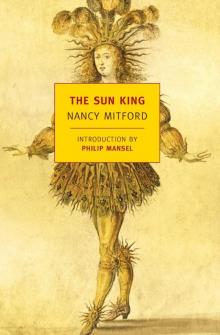 The Sun King
The Sun King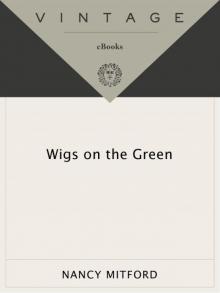 Wigs on the Green
Wigs on the Green Love in a Cold Climate
Love in a Cold Climate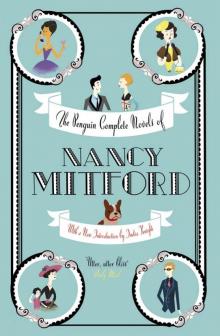 The Penguin Complete Novels of Nancy Mitford
The Penguin Complete Novels of Nancy Mitford The Pursuit of Love
The Pursuit of Love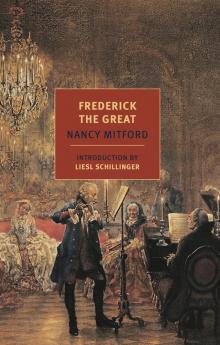 Frederick the Great
Frederick the Great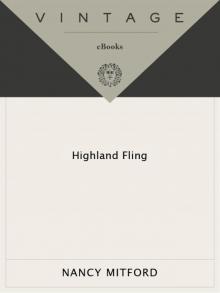 Highland Fling
Highland Fling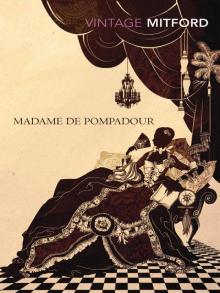 Madame de Pompadour
Madame de Pompadour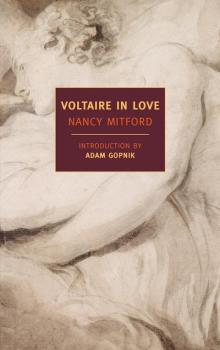 Voltaire in Love
Voltaire in Love Don't Tell Alfred
Don't Tell Alfred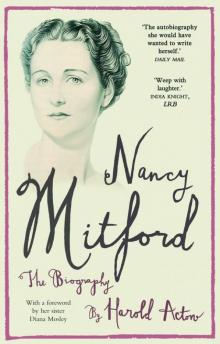 Nancy Mitford
Nancy Mitford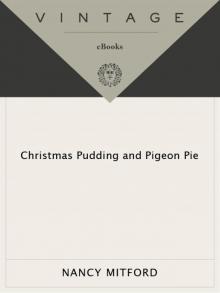 Christmas Pudding and Pigeon Pie
Christmas Pudding and Pigeon Pie